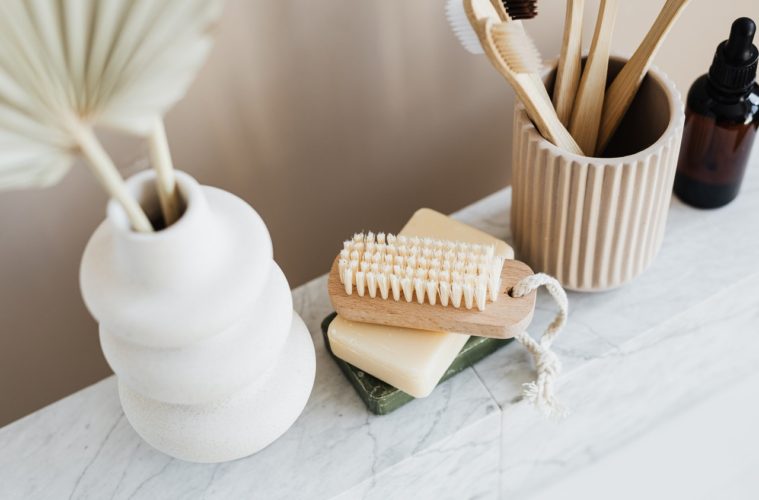Unless you have been living under a rock, you are probably aware of the environmental crisis our planet is facing. Making greener changes is key in pro-longing the life of our world. And you know, these changes can be so simple! With a little bit of understanding, there is hope that we can reduce our negative impact by implementing more sustainable swaps.
Reusable Cotton Pads
Makeup wipes – well, where do we begin. Putting a stop to using makeup wipes can make a HUGE difference to landfill contribution. Say you use 1 wipe a day, that works out to 7 wipes a week and 365 a year. Let us imagine 365 wipes all piled up… now that multiplied by the amount of people in the world who use them frequently. You are looking at over 7 billion makeup wipes thrown into landfill each year – crazy!
I get it, sometimes using a makeup wipe can be convenient since you can whip one out the packet and instantly take off the slap. We love convenience and ease, yet this can drive us into a bit of an unconscious cycle.
The great thing is there are many reusable options now available such as, reusable cotton pads. These are a more sustainable option than single-use cotton wool pads. Simply use them with a bit of makeup remover and throw them in the washing machine after use to re-use again – straight forward really!
Find here: Bambaw: Reusable Make Up Remover Pads – Pack of 16
Eco-Friendly Toothbrush
I know what you are thinking, a bamboo toothbrush? I am not a panda!
Opting for a bamboo or beechwood toothbrush over a plastic toothbrush is an excellent sustainable swap. By doing this, you are reducing your plastic waste contribution to landfill and the ocean. Bamboo and beechwood are natural, eco-friendly materials which biodegrade over time. Therefore, much kinder to our environment.
Just like a plastic toothbrush, eco-friendly toothbrushes should be changed every 3 months. They work the exact same as a regular toothbrush – do not worry, they will clean your sparkling gnashers just as well!
Find here: Georganics: Beechwood Toothbrush – Medium Bristles
Menstrual Cup
Did you know women in the UK averagely use up to 11,000 disposable menstrual products during their reproductive lifetime? You have got to admit, this stat is shocking.
Now, the thought of changing to a menstrual cup can be daunting for women. When it comes to periods, the last thing a woman wants to feel is uncomfortable. However, with time to slowly ease into the change, a menstrual cup is a great sustainable swap to go for.
Also, you will be saving plenty of pennies by making this swap. The average woman spends up to £5000 on sanitary products in their reproductive lifetime. Menstrual cups range from £15 to £30 and can last anywhere from 6 months to 10 years with proper care – I think it’s clear which option works out cheaper in the long run!
Find here: Mooncup: Menstrual Cup
Supersizing Products
Supersizing your products is an excellent sustainable swap. This is because less plastic waste will be sent off to landfill as you will not be re-purchasing as many product containers – the supersized products will last longer. Moreover, by doing this you will also reduce your rate of plastic waste.
Going for the supersized option may be more expensive initially, but you will find that they do work out cheaper long-term. Therefore, money saved, products lasting longer and our planet treated more respectfully – pretty good I say!
Reducing Animal Product Intake
Evidence states that animal agriculture is responsible for around 14.5% of greenhouse gas emissions. Environments such as The Amazon are being cut down to make space for cattle to graze – known as deforestation. As a result of this, wildlife is being killed due to destroyed habitats and causing the extinction of rare species. The rapid loss of biodiversity – the enormous variety of life on earth – is a threat to the world and our existence.
Reducing your animal product intake – meat, dairy and eggs – does not mean you must completely cut these out your diet. Introducing vegan and vegetarian options is a great way to experiment and have a change in the kitchen. With so many ve and veggie cookbooks and online recipes available, there is always something which can be served up to suit different taste buds.
Supermarkets also now provide a whole range of vegan and vegetarian options. Found both in the fresh and frozen isles and ‘freefrom’ section, there are many delicious alternatives to choose from. It can be as easy as picking up a soya mince over a beef, or going for a dairy-free ice cream – you can still enjoy your favourite meals with a more sustainable food swap!
Buying Second-Hand Clothes
Purchasing clothes from second-hand sources such as charity shops, thrift stores and online marketplaces are excellent options to combat fast fashion. This issue is spiralling out of control and will only improve if we start to make sustainable clothing swaps.
Find out more here: What You Can Do to Not Contribute Towards Fast Fashion
Sustainable Swap Round Up
Just remember, it is not about being 100% perfect when it comes to being more sustainable. However, as you can see, there are definitely things we can do to make a conscious effort. At the end of the day, it is down to us to make a difference!





